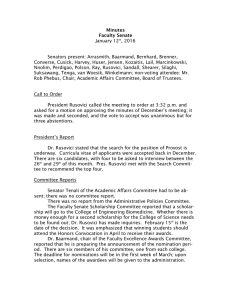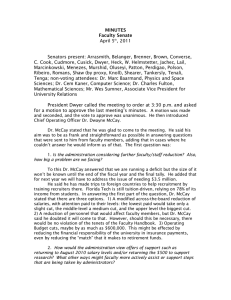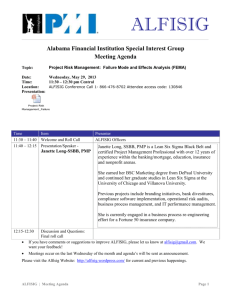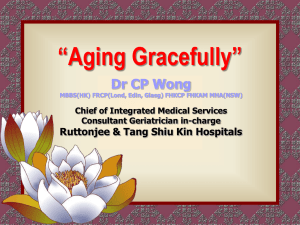November 2012 Minutes (#89)
advertisement
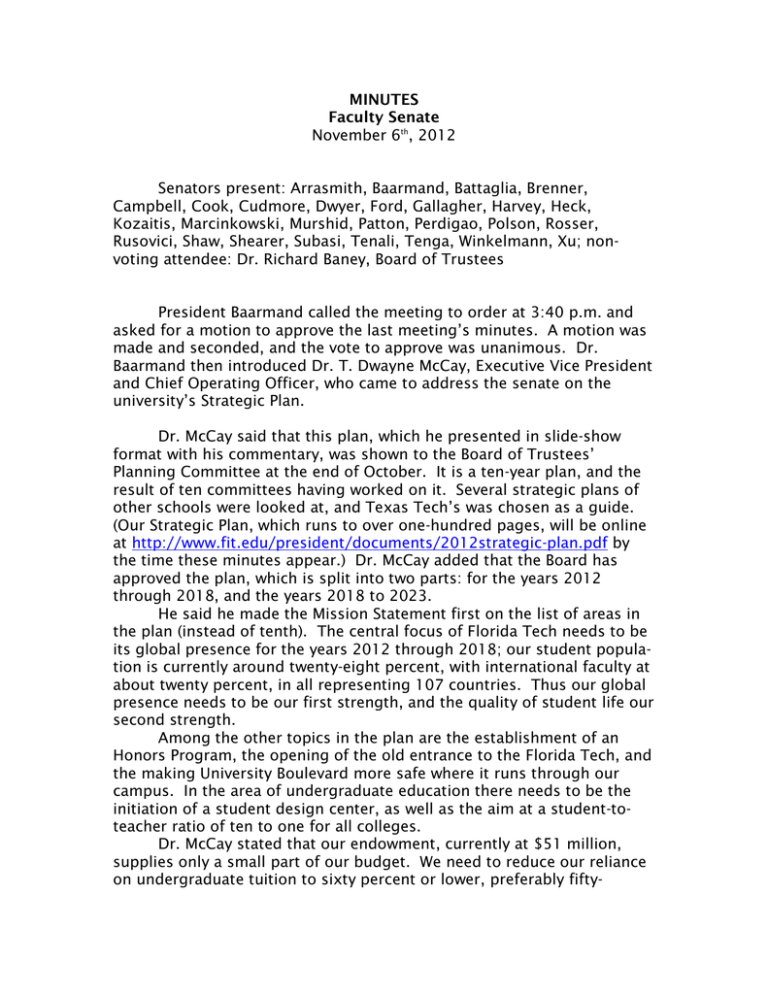
MINUTES Faculty Senate November 6th, 2012 Senators present: Arrasmith, Baarmand, Battaglia, Brenner, Campbell, Cook, Cudmore, Dwyer, Ford, Gallagher, Harvey, Heck, Kozaitis, Marcinkowski, Murshid, Patton, Perdigao, Polson, Rosser, Rusovici, Shaw, Shearer, Subasi, Tenali, Tenga, Winkelmann, Xu; nonvoting attendee: Dr. Richard Baney, Board of Trustees President Baarmand called the meeting to order at 3:40 p.m. and asked for a motion to approve the last meeting’s minutes. A motion was made and seconded, and the vote to approve was unanimous. Dr. Baarmand then introduced Dr. T. Dwayne McCay, Executive Vice President and Chief Operating Officer, who came to address the senate on the university’s Strategic Plan. Dr. McCay said that this plan, which he presented in slide-show format with his commentary, was shown to the Board of Trustees’ Planning Committee at the end of October. It is a ten-year plan, and the result of ten committees having worked on it. Several strategic plans of other schools were looked at, and Texas Tech’s was chosen as a guide. (Our Strategic Plan, which runs to over one-hundred pages, will be online at http://www.fit.edu/president/documents/2012strategic-plan.pdf by the time these minutes appear.) Dr. McCay added that the Board has approved the plan, which is split into two parts: for the years 2012 through 2018, and the years 2018 to 2023. He said he made the Mission Statement first on the list of areas in the plan (instead of tenth). The central focus of Florida Tech needs to be its global presence for the years 2012 through 2018; our student population is currently around twenty-eight percent, with international faculty at about twenty percent, in all representing 107 countries. Thus our global presence needs to be our first strength, and the quality of student life our second strength. Among the other topics in the plan are the establishment of an Honors Program, the opening of the old entrance to the Florida Tech, and the making University Boulevard more safe where it runs through our campus. In the area of undergraduate education there needs to be the initiation of a student design center, as well as the aim at a student-toteacher ratio of ten to one for all colleges. Dr. McCay stated that our endowment, currently at $51 million, supplies only a small part of our budget. We need to reduce our reliance on undergraduate tuition to sixty percent or lower, preferably fifty- percent. There needs to be an increase in annual giving/endowment to the $7.3 million level, as well as an increase of annual sponsored expenditures to the $33 million level. It is really our global presence that should be a top priority, Dr. McCay said, and to that end we should build a Center for Global Engagement as well as strategically expand international agreement opportunities. But the quality of student life should also be very important to us as well, with work going toward student, faculty and staff gender balance on campus; a new, centralized student union building serving as a hub for all student co-curricular activities, the renovation of the Florida Tech Anchorage property, more parking decks, and the rebuilding of the academic quad are also worthy projects. At the level of undergraduate education there should be the creation of minors in high-demand fields. Ending his presentation, Dr. McCay said that it is not enough to have a mere collection of goals; these become meaningful only if there is “roadmap to achieving them.” In the following question-and-answer session, Senator Winkelmann asked about the proposed changes to our academic calendar with the Winterim mini-semester. Dr. McCay answered that this is necessary for improvements in retention. With regard to year-round education, he said that though the university exhibits business-like aspects, it is not a business. Sen. Xu asked if it would be possible for the university to have an ocean-front research facility. Dr. McCay replied that that is not impossible. Sen. Gallagher raised the question of how far the university is committed to the concepts of green and sustainability in the Strategic Plan, and Dr. McCay responded that he is in favor of those issues without the wasteful expenditure on awards for those embracing them. Dr. Gallagher went on to ask about the closing of the school’s stretch of University Boulevard, and Dr. McCay answered that closing it would certainly make it less dangerous, but that the City of Melbourne probably won’t allow it. Sen. Ford inquired about the status of online education, and Dr. McCay replied that it is very profitable, bringing in $6.5 million a year, up from $4.5 million. This is also true for Extended Studies, bringing in $5 million in 2011, up from $3.9 million in 2010. Sen. Winkelmann asked if teaching domestic living skills is important to him, and Dr. McCay said he considered this goal to be a good idea. Pres. Baarmand thanked Dr. McCay for his presentation, and moved on to the President’s Report. He attended a meeting of the President’s Task Force October 15th where Chief Financial Officer Dr. Niebuhr reported concern for a slight downward trend in online revenues. Dean Bowers reported that retention is quite good. Dean Kenkel spoke on the goal of 2 internationalization for the university, and Dr. Nelson reported that the summer programs had been a big success. Dr. Baarmand also attended the Board of Trustees meeting. The Academic and Student Affairs Committee met on October 18th and it was reported that our enrollment and retention are the best in many years, but with the attendant problem of a shortage of beds. Thirty-five new faculty have been hired. Dr. McCay also spoke there on the academic performance of our athletes, which is gauged by high school GPA. The average non-athlete’s GPA is 3.59; the average athlete’s GPA is 3.58, and for athletes in the football program, it is 3.54. Speaking of football, Dr. McCay reported that there is a surplus of revenue here: including donations, it is at $1.935 million, while expenses over two year, including salaries, have been $1.2 million. The new programs Dr. McCay reported on include BioMed Engineering, a music minor, an MS in Human Center Design, and an MS in Cyber Security. There is exploration of a law degree program with concentration in intellectual property and patent law. Also, though Dr. Baarmand reported some board members resisted the idea, the consideration of a Doctor of Osteopathic Medicine program was raised. As for new research opportunities, Dr. McCay discussed our collaboration with the Jet Propulsion Laboratory and with commercial space transportation. There are ongoing discussions regarding a major research enterprise, the Space Exploration Institute, with a budget of about $25 million a year, and with Florida Tech leading several participating Florida institutes. Vice Provost for Enrollment Management Gary Hamme reported that enrollment is up, and retention is at eighty percent (in contrast to the old fifty-to-sixty percent); our next goal, he said, is eighty-five percent. The marketing strategies used in gaining more students has helped. Associate Vice President for University Relations Wesley Sumner and Associate Provost for University Marketing Jennifer Neuhard gave very upbeat reports on marketing online and offline, in both the national and international realms. Director of Athletics Bill Jurgens reported progress all around in the arena of Florida Tech sports, especially with regard to scholar athletes in both football and tennis. Board member Mr. Jack Pruitt spoke on the benefits of year-round education: increased revenue brought about by full utilization of our resources and facilities, improved graduation rates, and integration of coop programs better to prepare students for the job market, among others. Turning to the full Board of Trustees meeting of October 19th , Pres. Baarmand reported that Dr. Catanese had reprised his State of the Uni- 3 versity presentation there. Dr. Baney and others from the various committees of the Board gave their presentations. Dr. Baarmand reported that CFO Niebuhr has made an analysis of the year-round education idea presented by Mr. Pruitt. Dr. Niebuhr said that, under a host of assumptions about this consideration, the chief being an increased annual enrollment of four hundred students, there would be a positive impact of about five million dollars. The next step is to determine precise cost factors. Pres. Baarmand reported that, in a conversation he had with Mr. Pruitt, it became clear that the latter’s projections did not include the potential cost of additional faculty to teach in all trimesters. The Winterim mini-semester, to go into effect Spring of 2014, needs a calendar with fifteen weeks of instruction; the previous calendar allowed only fourteen, which the Winterim Committee deemed insufficient. Dr. Baarmand pointed out that there are still a number of major issues with the implementation of the Winterim; we still need a costbenefit analysis that takes into account the interests of students not needing remedial courses, and as well realistic statistics/projections on increased retention need to be calculated. This observation ended Pres. Baarmand’s report. Dr. Harvey of the College of Psychology and Liberal Arts stated that one of the problems with the year-round education proposal is that it would make scheduling internships very difficult. Committee Reports Sen. Tenali, head of the Academic Policies Committee, reported that he has heard from only two departments concerning the year-round education proposal of Mr. Pruitt; both pointed out that additional faculty would have to be hired. Pres. Baarmand asked that faculty input on this issue be given to Dr. Tenali. In the last meeting’s minutes, a list of issues concerning this proposal was included; an augmented list appears as an attachment-link at the end of the current minutes, and any further issues may be added to it by contacting Sen. Tenali. Sen. Marcinkowski proposed the idea of a survey to faculty on this matter. Sen. Brenner of the Administrative Policies Committee reported that the Administrator Evaluation forms will be available before Thanksgiving. There was no Faculty Excellence Committee report and no Scholarship Committee report (both are “out of season”). There was no Welfare Committee report. As well, there was neither old nor new business. 4 By unanimous consent, the meeting was adjourned at 4:59 p.m. Respectfully submitted, Bob Shearer, Secretary (Please follow the link below for Attachment #1.) YRE at FIT.pdf (345 KB)[Open as Web Page] 5
